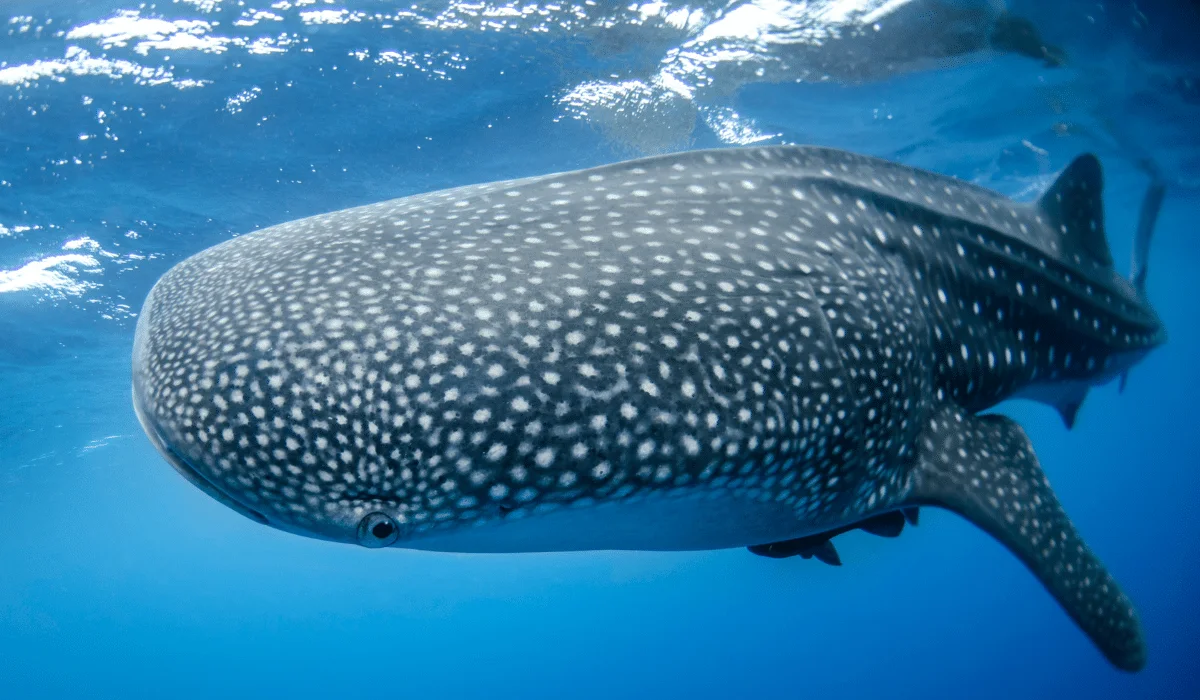Get ready to be amazed by the largest whale shark ever recorded! This gentle giant of the ocean measured an impressive 41.5 feet (12.65 meters) in length and weighed an estimated 47,000 pounds (21,500 kg).
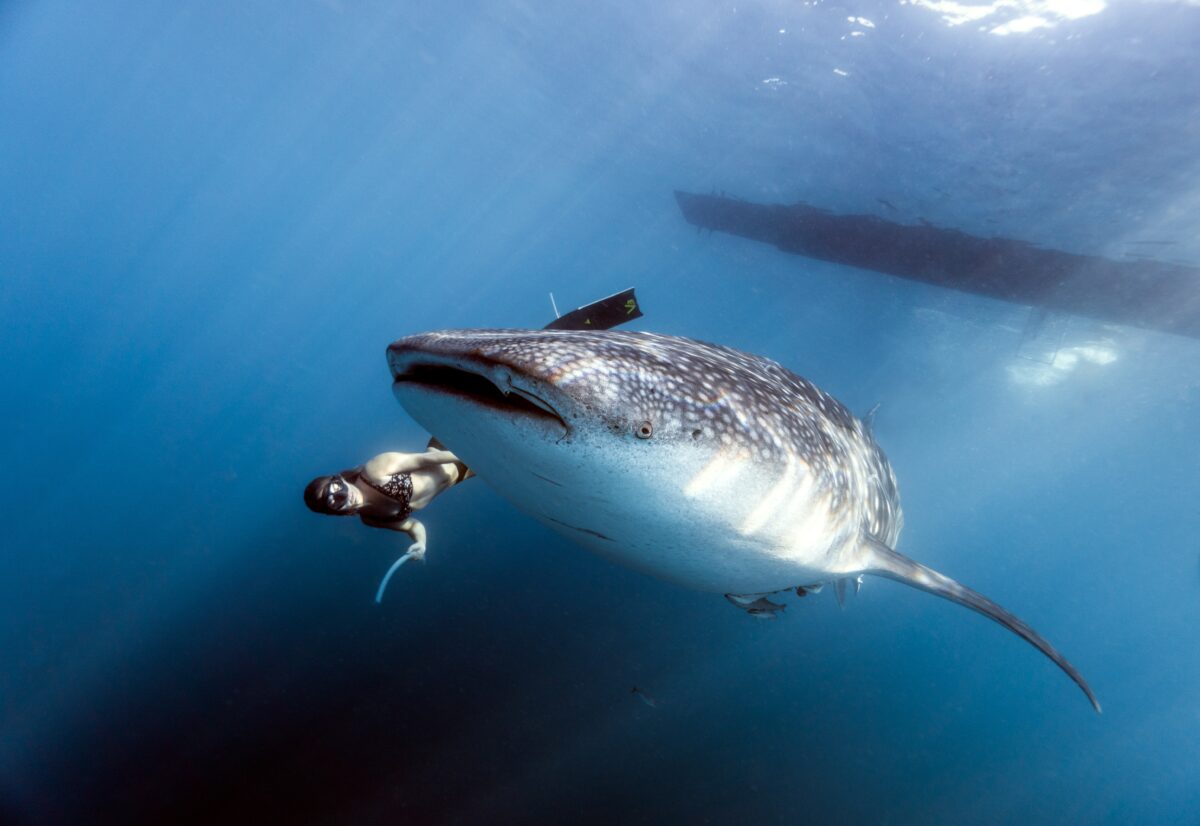
Caught off the coast of Pakistan in 1947, this incredible specimen is now on display at the Marine Fisheries Department in Karachi.
But who knows what other colossal whale sharks are out there, waiting to be discovered? Let’s dive in and learn more about these magnificent creatures.
Key Points
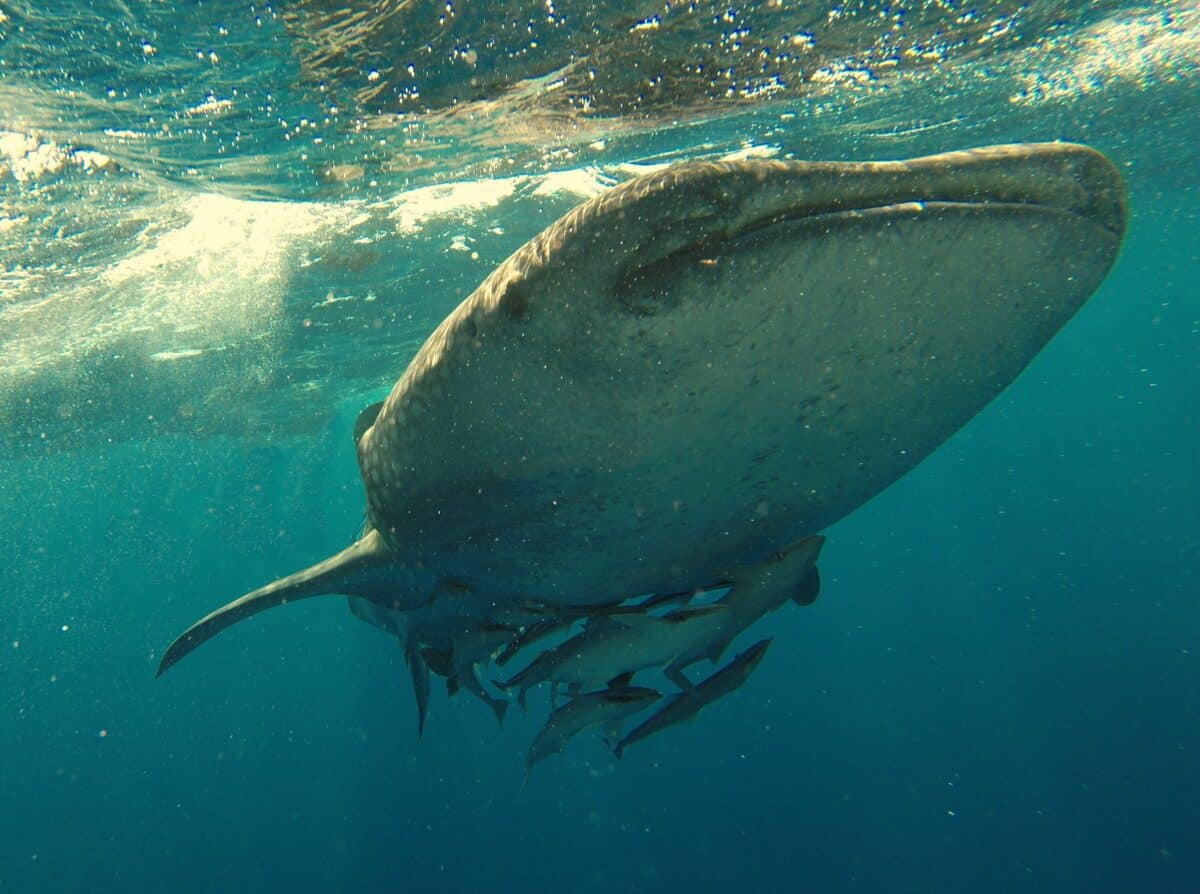
| Key Point | Details |
|---|---|
| Size | 41.5 feet (12.65 meters) in length |
| Weight | Estimated 47,000 pounds (21,500 kg) |
| Capture | Off the coast of Pakistan in 1947 |
| Display | Marine Fisheries Department in Karachi |
| Accuracy | More prominent individuals may exist but have yet to be officially recorded |
| Identification | Not whales but the world’s largest fish species |
| Feeding Habits | Filter feeders that primarily eat plankton and small fish |
| Conservation Status | Vulnerable species due to overfishing and habitat destruction |
| Importance in Ecosystem | Help maintain a healthy ocean ecosystem by balancing the marine food web |
| Ecotourism | Support the ecotourism industry, attracting tourists and generating revenue for local areas |
| Cultural Significance | Considered sacred animals in some communities |
| Fun Facts | 1. Unique skin patterns, 2. Can live up to 100 years, 3. Docile nature, 4. Unique individual markings, 5. Fast-swimming fish |
The Largest Whale Shark Ever Recorded
The largest whale shark ever recorded was a female measuring 41.5 feet (12.65 meters) in length and weighing an estimated 47,000 pounds (21,500 kg). IF you would like you can compare
This enormous shark was caught off the coast of Pakistan in 1947, and the specimen is currently on display at the Marine Fisheries Department in Karachi.
However, it’s worth noting that because whale sharks are difficult to measure accurately in the Wild, more prominent individuals may exist but have yet to be officially recorded.
The Whale Shark – A Summary
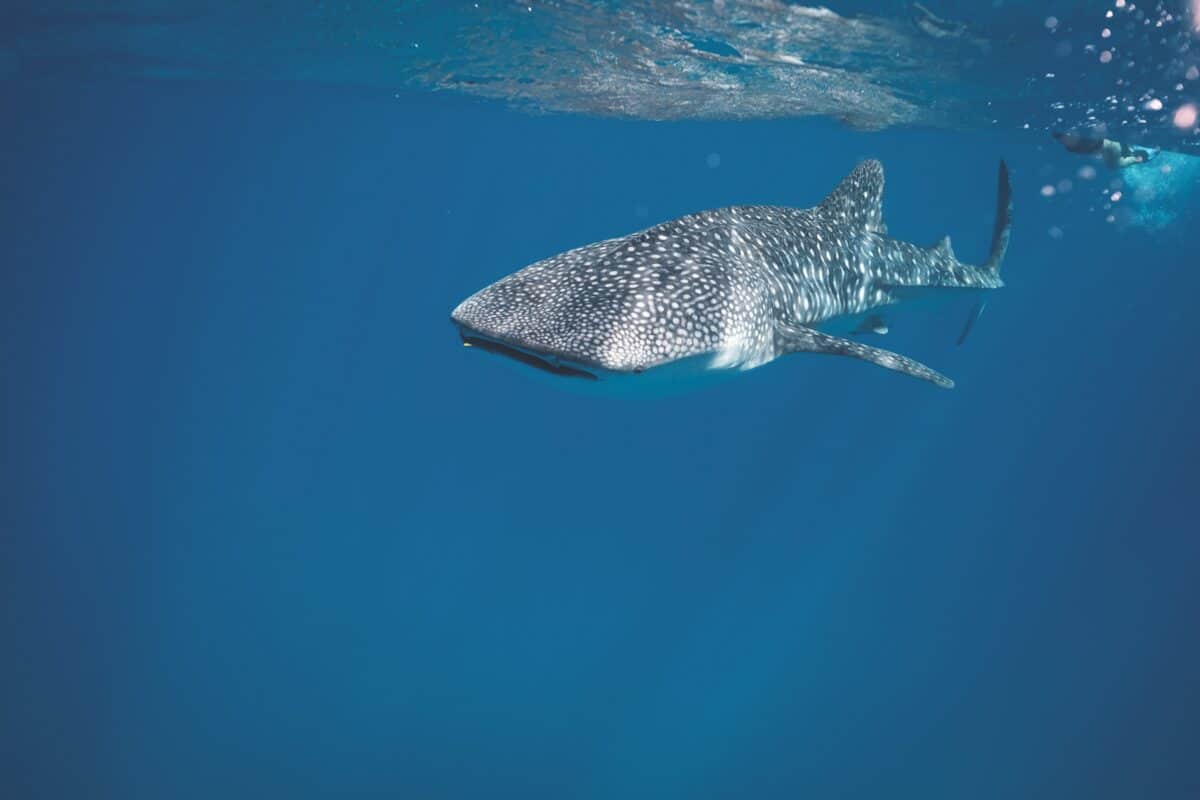
The whale shark have a massive size, reaching lengths of up to 40 feet (12 meters) or more.
Despite their name, they are not whales but the world’s largest fish species.
Whale sharks are filter feeders in warm waters worldwide, mainly on plankton and small fish.
They are vulnerable species due to overfishing and habitat destruction and are protected by many countries.
Importance of the Whale Shark in the Ecosystem
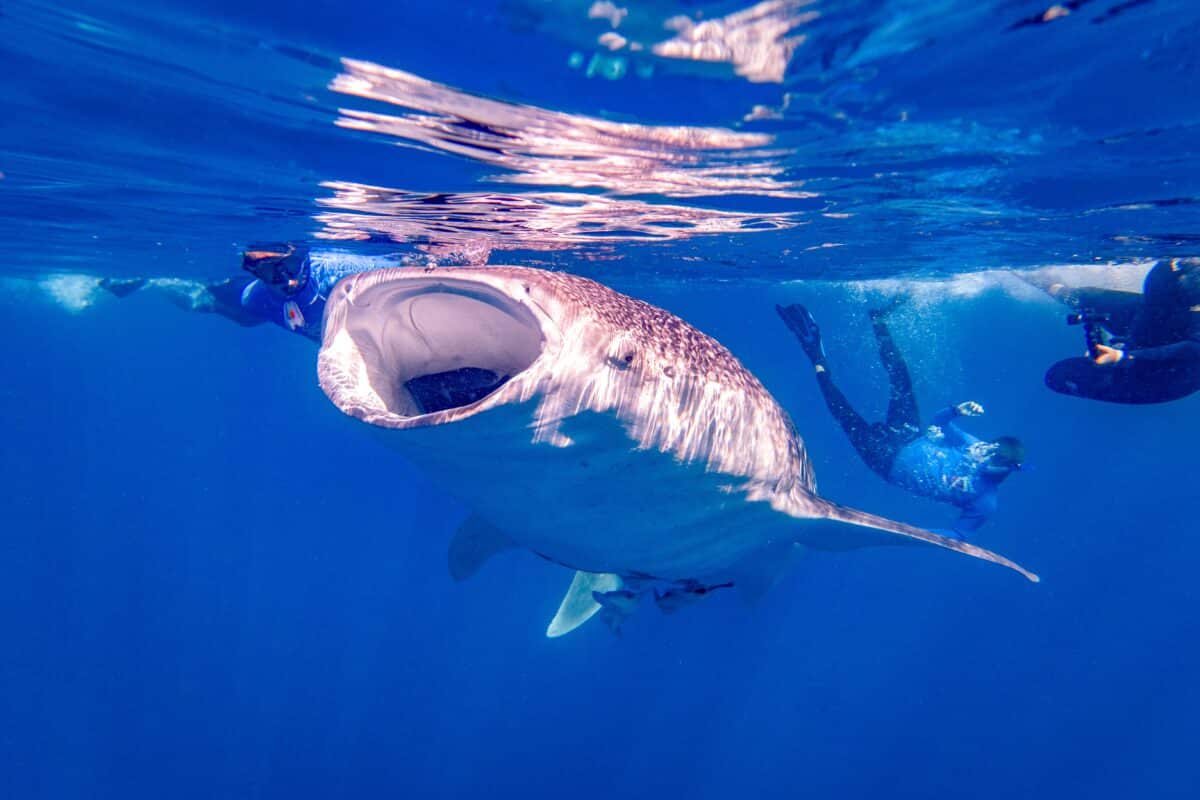
Whale sharks are the superheroes of the ocean, working tirelessly to keep our marine ecosystem in tip-top shape. These gentle giants are masters of filter feeding, chowing down on massive quantities of plankton, krill, and small fish. By doing so, they play a vital role in maintaining the delicate balance of the marine food web.
But wait, there’s more! Whale sharks are not just amazing eaters; they’re also incredible indicators of ocean health. These majestic creatures are quite sensitive to changes in water temperature and quality. So, when something’s amiss in the ocean, they’re like the ocean’s version of a canary in a coal mine, giving us valuable insights into the state of our underwater world.
We owe a big thank you to these magnificent whale sharks for their tireless efforts in keeping our oceans healthy. So, let’s do our part to protect their habitats and ensure a bright future for these gentle giants and the entire marine ecosystem they help sustain.
Whale sharks also contribute to the thriving ecotourism industry, attracting visitors from around the world. People travel to see and swim with these gentle giants, providing significant economic benefits to local communities. From boat operators to hotels, the presence of whale sharks generates revenue and job opportunities, making them valuable assets for sustainable tourism.
Whale sharks hold cultural significance in many countries, symbolizing a sacred connection to the ocean. Protecting these gentle giants is not only essential for the health of the ocean ecosystem but also for preserving the cultural heritage of coastal communities.
5 Fun Facts
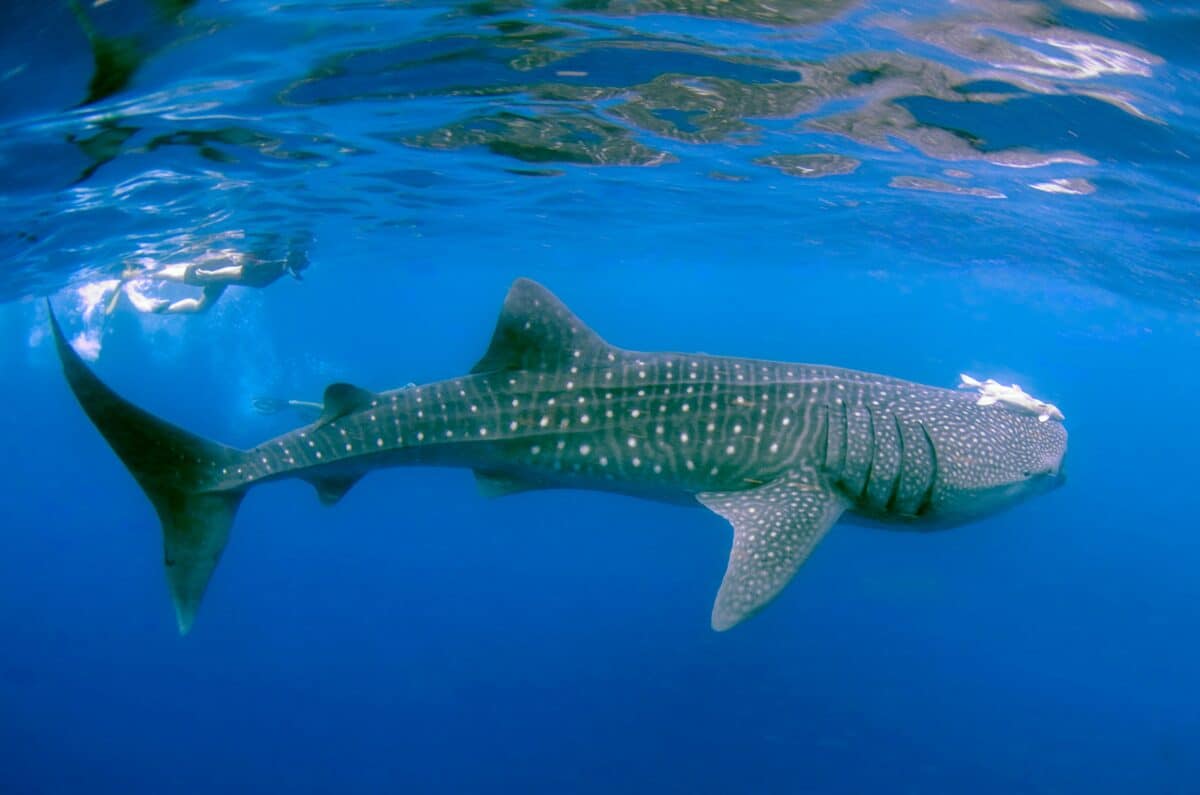
Here are five fun facts about the whale shark:
- Despite their large size, they are filter feeders and primarily eat plankton and small fish.
- They can live up to 100 years in the Wild, making them one of the longest-lived fish species.
- The spots and stripes on a their skin are unique to each individual, much like a human fingerprint.
- They are one of the few species that are docile and can swim with humans in the water.
- They can swim at relatively high speeds of up to 10 mph (16 km/h). Making them the fastest-swimming fish in the ocean.
The Bottomline
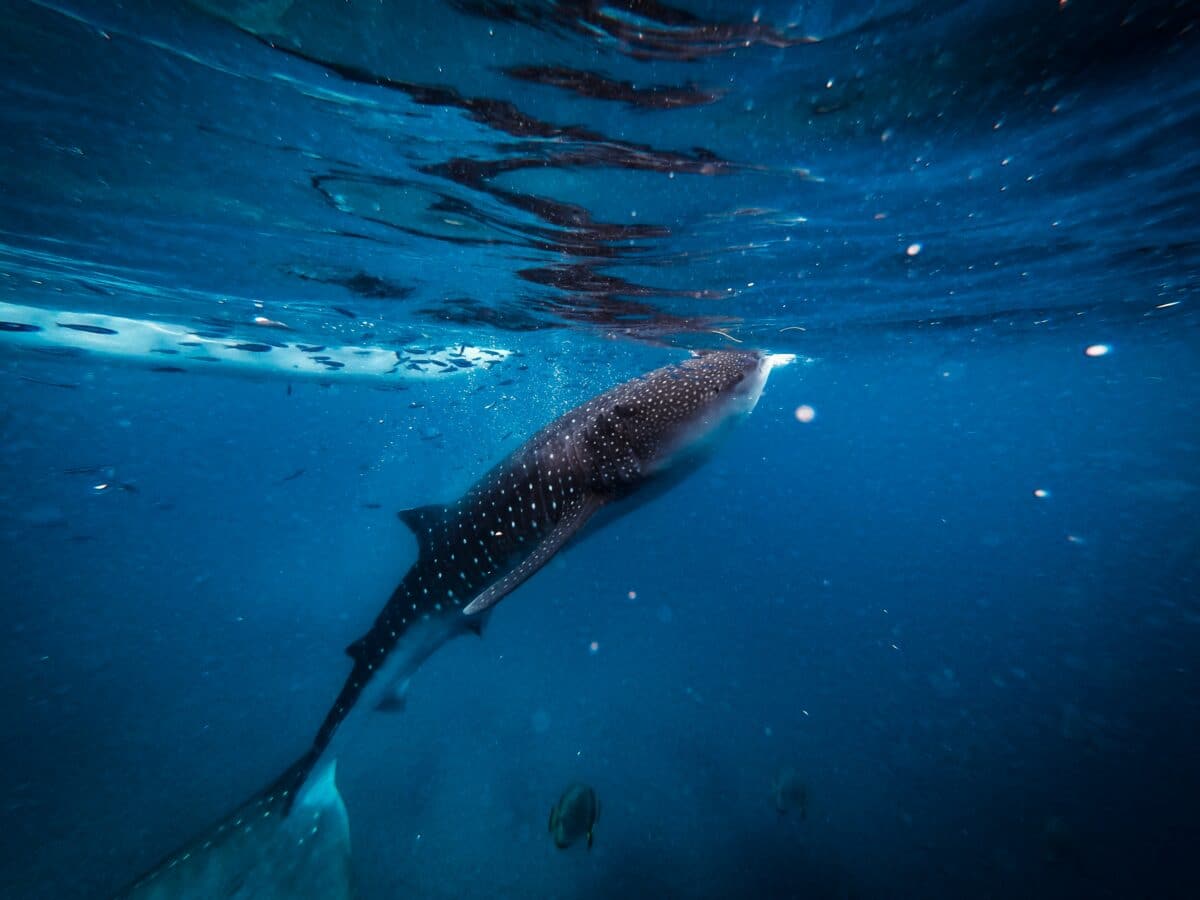
The largest whale shark ever recorded was a female that measured 41.5 feet in length and weighed an estimated 47,000 pounds. This enormous shark was caught off the coast of Pakistan in 1947. It is now on display at the Marine Fisheries Department in Karachi.
This species are the world’s largest fish species and are filter feeders that primarily eat plankton and small fish.
They play an essential role in balancing the marine food web, and protecting them and their habitats is vital for the ocean ecosystem’s health and many coastal communities’ cultural heritage.
These species are also significant for ecotourism as many tourists travel worldwide to see and swim with these gentle giants. Finally, some fun facts about whale sharks include their unique skin patterns, docile nature, and ability to swim relatively quickly.

Thank you for following along with this article!
Next up in the animal-news world:
- Mass Deaths of Dolphins in the Black Sea Linked to the Russians
- Pregnant Hammerhead Shark Washes Ashore in Alabama
- 2,000 Endangered Rhinos to the Highest Bidder
- Discover The Most Massive Gorilla Ever (860 Pounds)
- Watch a Tiger taking on an Elephant in the Wild.
- Discover the World’s Most Colossal Anaconda (33-Foot-Long)
Frequently Asked Questions (FAQs)
Q: Where are whale sharks found?
A: Whale sharks can be found in warm and tropical waters around the world. They are known to inhabit all three major oceans: the Atlantic Ocean, the Indian Ocean, and the Pacific Ocean. Popular locations to spot whale sharks include the Maldives, Australia’s Ningaloo Reef, the Philippines, Mexico’s Yucatan Peninsula, and the Seychelles.
Q: What do whale sharks eat?
A: Despite their massive size, whale sharks are filter feeders and primarily feed on plankton, krill, and small fish. They swim slowly through the water with their mouths wide open, filtering large volumes of water and trapping tiny prey in their gill rakers. Occasionally, they may also consume small squid or other invertebrates.
Q: Are whale sharks dangerous to humans?
A: Whale sharks are generally considered to be gentle and harmless to humans. They have very large mouths, but their throats are relatively small, limiting their ability to consume large prey or swallow humans. Additionally, their diet consists mainly of plankton and small fish. Interactions with humans, such as swimming or diving alongside whale sharks, are popular activities in many locations and are typically safe if conducted responsibly and with proper guidance.
Q: Are whale sharks endangered?
A: Yes, whale sharks are classified as an endangered species. They face various threats, including accidental entanglement in fishing gear, ship strikes, pollution, and habitat degradation. Additionally, the demand for their fins, meat, and other body parts in some parts of the world poses a significant threat to their survival. Conservation efforts, such as establishing marine protected areas and promoting responsible tourism practices, are crucial for their protection and recovery.
Q: How long do whale sharks live?
A: The exact lifespan of whale sharks is not yet fully understood. However, estimates suggest that they can live for around 70 to 100 years. Researchers are still studying their life cycle and gathering data to gain a better understanding of their longevity.
Q: Can whale sharks be kept in aquariums?
A: Whale sharks are highly migratory creatures that require vast areas to roam. Due to their large size and specific environmental needs, it is extremely challenging to keep them in captivity. As of now, there are no known successful long-term displays of whale sharks in aquariums. Instead, efforts focus on studying these magnificent creatures in their natural habitat.
If you liked this, share with your friends and family!
- Leopard Catches Domestic Dog – but he Escapes! - April 25, 2024
- Mom and Daughter Takes Hen and Chicks to the Store in Backpacks - April 24, 2024
- Watch: German Shepherd thinks he’s dying at the grooming salon - April 24, 2024

